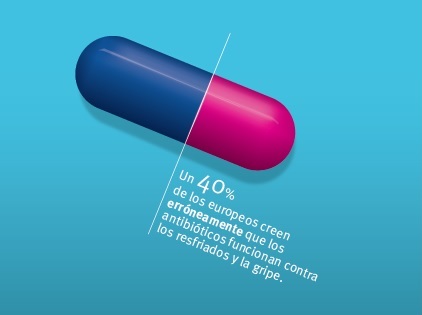On the occasion of the celebration of the European day for the responsible use of antibiotics, last November 18th, the Technological Centre CIDETEC and the Institute for Health Research Biodonostiaorganized the event: ”Let's talk about the proper use of antibiotics!” which aimed to raise public awareness of the consequences of misuse and abuse of the consumption of antibiotics while making public the scientific advances in this field through nanotechnology.
What is resistance to antibiotics? How can antibiotics be used responsibly? What efforts are being made in the field of research to develop new antibiotics or other alternatives? And ... what does nanotechnology have to do with all this? These questions were tried to be answered plainly in the Keler space in San Sebastian by means of two scientific presentations and interactions with the audience in a relaxed and close atmosphere.
This event was organized by the Technological Centre CIDETEC and Biodonostia Health Research Institute which coincided in time with the European day for the rational use of antibiotics which is an annual European public health initiative. Its aim was to raise awareness regarding the threat that the resistance of bacteria to antibiotics poses to public health, and promote its responsible use. Public awareness can substantially benefit from this.
The event included a lecture from Doctor Maialen Ibarguren, specialist of the Donostialdea OSI and resarcher from Biodonostia IIS. Doctor Ibarguren spoke of resistance to antibiotics, about how some bacteria are naturally resistant to certain antibiotics but that in many cases it becomes an acquired resistance. Resistant bacteria survive in the presence of antibiotics and continue to multiply, not curing the disease. One of the factors that most influences the appearance of resistant bacteria is the use of excessively "powerful" antibiotics (ie antibiotics that are useful in the treatment of a specific type of bacteria but also for many others too), in order to treat infections caused by bacteria that could be eliminated by using "simpler" antibiotics; they are often used like" sledgehammers to crack nuts”. A reasonable use of antibiotics is required, which means using antibiotics only when there is a bacterial infection and to do so with the appropriate antibiotic, the exact dose and not prolonging the treatment unnecessarily. Different national and international studies suggest that between 30-50% of the prescription of antibiotics can be improved; the data referring to the BAC show similar figures.
Moreover, the researcher Marco Marradi presented the European project 'PneumoNP' (https://www.labsexplorer.com/site/pneumonp_3) led by CIDETEC, which tries to tackle this problem through the development of new drugs and diagnostic systems using tools such as nanotechnology to improve effectiveness and reduce the side effects of drugs. As the researcher explained, one example of the application of nanotechnology is that of nanodiagnostics, which aims to develop systems and image analysis based on nanotechnology to detect a possible disease at earlier stages both in vivo (nanoparticles that can penetrate the body and identify the presence of a pathogen or cancer cell) or in vitro (based biosensors nanodevices). In nanotherapy, the aim is to selectively direct nanosystems to cells or tissues in order to transport and release drugs and thus achieve a more effective treatment, minimizing side effects. Also, the use of nanoparticles can improve the efficacy of drugs by increasing water solubility and body stability while protecting its physical and chemical degradation as well as increasing body exposure time and preventing rapid excretion by easily penetrating infected areas.
In conclusion, the prudent use of antibiotics is everyone's duty: it can help stop the development of resistant bacteria and make antibiotics remain effective for future generations. The use of nanotechnology to explore new forms of treatment is a challenge that researchers need to undertake, as nanomedicine is today one of the most important emerging fields within medical research.
